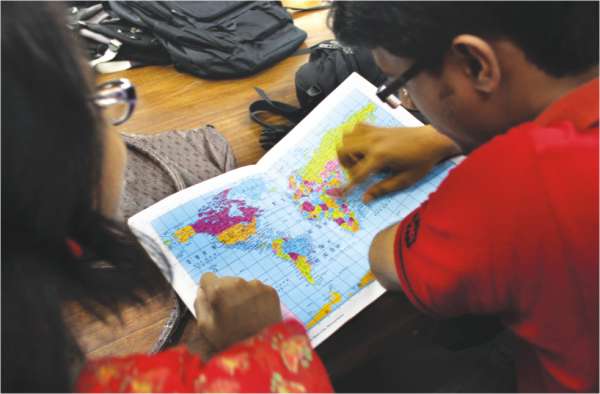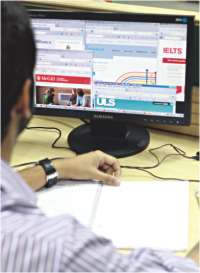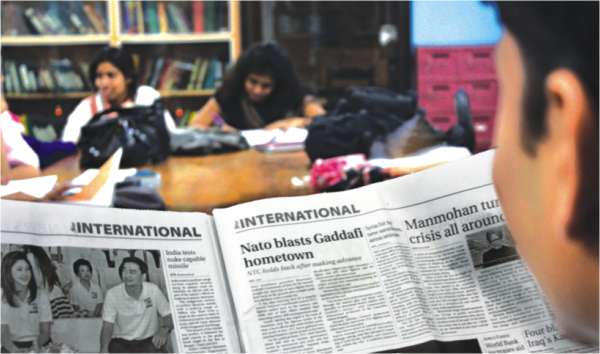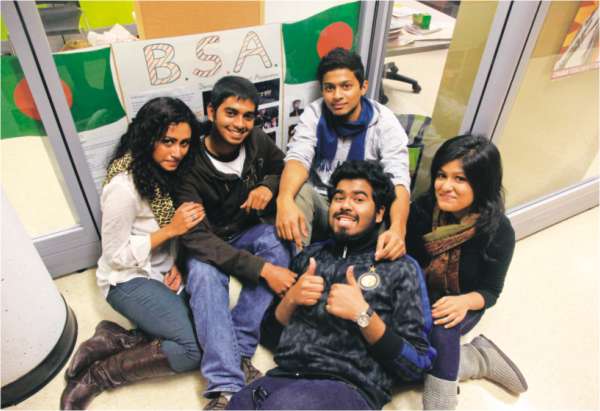| Spotlight

Stepping out of the comfort zone
Sumaiya Ahsan Bushra
Photos: Kazi Tahsin Agaz Apurbo
It's 2012! The world will end this year! With such remarks or lets say rumours going around, two kinds of responses from the glowing youth might come about. One being of a pessimist, who truly believes that the world is coming to an end and justifies his statements by mere examples of global warming, recession and nation wide poverty while on the contrary, another, who is an optimist believes that the world is certainly going to rotate another thousand years! Well, good for that optimist, who lives by the golden mean and opts for a positive notion, looking into the future with hopeful eyes that there is something greater to come in the years ahead.

Students should plan ahead about studying abroad and coming back to their country to work.
| |
 |
| |
The application process can be overwhelming. |
For this human entity, who seeks into the days coming ahead, hope might be there but trifles and boundaries do seem endless. Questions like, what exactly am I doing here, in Bangladesh? What are my prospects? I want to go abroad, but where will I go, how do I proceed and who will help me? And in the end the big question for those planning to go abroad comes in a not so fascinating imaginary bubble-do I want to come back to my country and become of one the very few nation builders?
With so many questions and confusions in mind, a nation wide review was to be sought. What are they thinking was the primary question? A group of students from a private university in Dhaka states, “We do want to go abroad. But the thing is, there is no proper guidance. We are in our fourth year. We read instructions online on university websites, but gulping down all that information is really not easy. I mean to identify which information to filter out is hard. Then there is a problem of getting a scholarship. At times, no matter what our grade is, it is either not acknowledged by foreign universities or the scholarship they can offer is too little.”

Students should go to different education fairs and seek help from education counsellors, centres regarding study abroad programmes .
Michelle Draper, a Lecturer, who returned to Bangladesh and is currently working at private university, gives a few tips on this issue. She states that one should do their own research regarding the university he/she wishes to apply to, the desired course, duration, expenditure, required exams, deadlines etc. The student can then apply to the university directly, or through a student agent. Falcon Education is one counselling service which can come handy.
 |
|
Studying abroad is a culturally and intellectually enriching experience.
Courtesy: Sabhanaz Rashid Diya |
|
Regarding sponsorship or financial aid, Draper says, “Most universities have funding which is provided from their different schools. Also they are minority groups which get funding. The funding is not always advertised on the websites, applicants need to contact the desired schools and ask about funding or teaching assistant (TA) opportunities. Some universities offer funding depending on IELTS, GRE scores as well as the subjects the applicants intend to study, this depends widely on that particular subject's importance in the applicant's country.”
In order to enhance one’s chances of getting a scholarship, "The student should score well on the university recommended test. A well-written statement of entry in which the student explains how the subject he/she plans on studying can benefit himself/herself and his/her country, can also increase the chances of getting funded," asserts Draper.
However, Rajiv Ashrafi, a student who had recently finished his Master's degree from the UK, gives his insight regarding these problems. “The initial step is to list down the number of universities that one wishes to apply to. Then accordingly, apply to the right department, under which you plan to do your programme. They will ask you to write, a statement of purpose, which is basically, a mutual agreement between you and the university. Here, one should justify why he is eligible for the degree, how his final research can benefit the university and how it will help the individual to develop his career and/or nation.”

Students should not restrict themselves to national borders when it comes to gaining knowledge.
Ashrafi further suggests, “For universities in the UK, it is probable that they do not recognise a Bangladeshi degree, in such cases, the students have to send the respective university the necessary documents, a statement of clarification, to show that the university they have obtained the degree from is well-reputed within the country, UCG approved and offers similar degree which match foreign standards. The website of the private university they have attended should be sent to the university abroad.”
| |
 |
| |
Our drive for ambition will strengthen with exposure and experience. |
Tahrima Ahmed Trishna, another student who applied for a Master's programme in Canada for Public Policy states, “It was fairly easy, the universities did not seem to intimidate me for any kind of clarification of my degree. I had a decent IELTS score, and North South University and my current university are pretty well known as well.”
Currently only two well known and reliable places provide information, regarding these querier. The American Centre of Dhaka, which does have professional counsellors, can help students who want to apply to United States for Master's programme. British Council is another organisation which aids students with expert help through their Professional Advisory Service for Students (PASS) system. During the year their team runs seminars to prepare students for studying and living in the UK. Other organisations which do provide information are not substantial, mostly because their embassy representatives are often unprepared. Additionally, other foreign embassies do provide aid and organise seminars, but one will have to keep constant contact with such organisations in that case.
In most UK universities, scholarships are rarely given to students applying from private universities. In rare cases, exceptions have been made, for those talented individuals who have studied in private institutions, excelled in academics and received a partial scholarship from universities in England. However, majority of the times, students have to sponsor for themselves, which ever country they choose to go to. Upon applying for visa, they are asked to show the specific amount of money they will need to cover their education and living expense. Tahrima Ahmed Trishna says, “I applied to Canada, and I was asked to show a fix deposit of a large sum of money by the embassy. With our current economic state, it almost seems impossible to show such an amount.” Such issues at times can be quite difficult to handle for many. Large ratios of students from private universities do come from middle class families, who want foreign education but cannot afford one. What could be made of them? How do they justify their situation to the embassies?

Government and private companies should take initiatives to finance students to study abroad. Courtesy: Sabhanaz Rashid Diya
To tackle this problem, should not the government take initiatives, to help its middle class citizens- the future of the nation? Can the private sector contribute to some extent? Booming garments industries, telecommunication houses, multi nationals- can they come to their rescue? Singapore, which has a flourishing industry for technology and massive business centres, has opportunities for its bright talents that Bangladesh can follow as a model. Real estate companies, who hire freshly graduated architects, can hand pick one or two of these individuals and send them for a foreign Master's programme under a contract so that they return and work for at least two to three years for the company afterwards. In this way, the organisations are being benefited as well, as they no longer need to hire expensive experts because they are creating them within the organisation. Like wise, telecommunication companies can also have existing engineers who wish to opt for a Master's degree but cannot afford to because of financial deficiency.
If these organisations can involve themselves largely to the development of their organisation by hiring young talents every year through grand competitions and extensive and valuable workshops, then young people will surely learn how to become competitive and efficient, and confident in making big decisions such as applying abroad for education.
|
